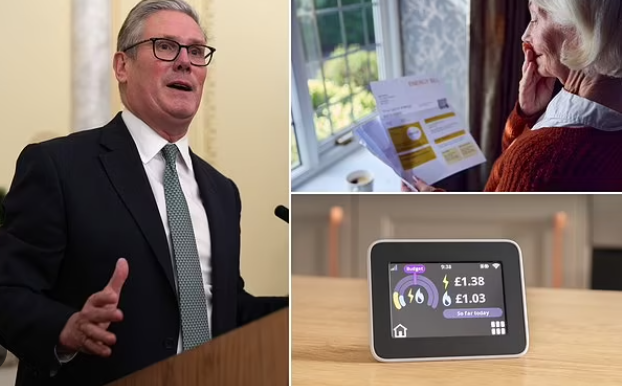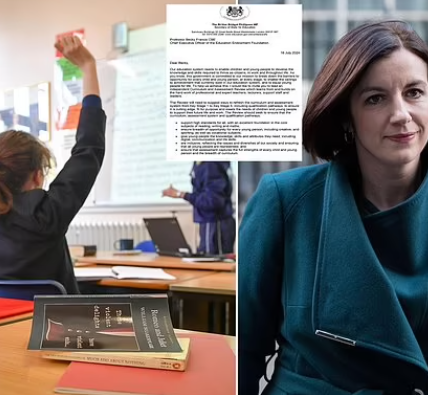Millions of households face doom and gloom as energy bills set to go up AGAIN in April after January hike – despite Keir Starmer pledging to put ‘more cash’ in Brits pockets_Nhy
Millions of households facing an energy bill hike today have been told to prepare for a further rise in April – leaving Labour at risk of breaking another election pledge.
The increase in the energy price cap on 1 January will take the typical annual bill to £1,738. And a new forecast suggests it will rise further to £1,785 from 1 April.
That would be the third hike in a row and mean annual energy bills have gone up by £217 since Labour took power.
It will add to the pain for households already facing sharp increases early this year (2025) in the price of everything from water bills and council tax to TV licence fees and bus fares.
And it will leave energy secretary Ed Miliband even further from achieving his promise to bring energy bills down by £300 by 2030.
Critics say Mr Miliband’s plans to switch to green energy will do the opposite, as bill payers foot the vast cost of investment needed.
It comes as Sir Keir Starmer uses his New Year message today to vow to put ‘more cash in your pocket.
In a gloomy message, the Prime Minister said he understood that it is ‘hard’ for many people to ‘think about the future when you spend all of your time fighting to get through the week’.

Sir Keir Starmer uses his New Year message today to vow to put ‘more cash in your pocket’ – pictured speaking during a reception to celebrate Chanukah at 10 Downing Street

The increase in the energy price cap on 1 January will take the typical annual bill to £1,738 (stock)

It will add to the pain for households already facing sharp increases early this year (2025) in the price of everything from water bills and council tax to TV licence fees and bus fares (stock image)
He pledged to ‘fight for change’ – including putting ‘more cash in your pocket, wherever you live’.
But the Tories and Reform criticised his remarks, coming just weeks after Labour announced £40 billion of tax rises.
The prospect of paying even more for energy will send a chill through millions of households with boilers already on full blast as a cold spell descends across Britain.
And it comes as 10 million pensioners already face a winter with less support, after Labour scrapped winter fuel payments worth up to £300 for those not in receipt of pension credits or other benefits.
Tory energy spokesperson Claire Coutinho said: ‘Ed Miliband’s net zero zealotry will cost households billions of pounds in higher bills and taxes.
‘Far from their election promise to cut bills by £300, we now know energy bills will go up by hundreds of pounds under Labour with 10 million pensioners left in the cold after having their Winter Fuel Payments snatched away.’
Meanwhile, tax rises announced by Rachel Reeves in the autumn are already taking their toll on the wider economy.
Conservative business spokesman Andrew Griffith said: ‘At a time Labour’s budget is hitting people’s pockets and putting their jobs at risk, the rising cost of their energy policy is another blow.’

Ed Miliband’s net zero goal has been slammed by Tory spokesperson Claire Coutinho who said it will ‘cost households billions of pounds in higher bills and taxes’

The energy price cap is set by regulator Ofgem every three months, based on fluctuations in global gas and electricity markets
It is another broken promise of many from the simply false manifesto they were elected upon.’
The energy price cap is set by regulator Ofgem every three months, based on fluctuations in global gas and electricity markets. It forces energy suppliers to cut bills when global prices fall but allows them to be hiked when global prices rise.
The cap rose sharply in October, increasing typical annual bills by £149.
Today’s hike adds a further £21 while analysts at consultancy Cornwall Insight predict another increase in April adding a further £47.
The forecast comes after a rebound in wholesale energy prices – which have climbed by 20 per cent in the past two weeks – amid uncertainty over gas supplies transmitted via Ukraine and higher demand during a spell of cold weather in Europe.
April’s energy price cap will be officially announced by Ofgem next month (FEB).
Craig Lowrey, principal consultant at Cornwall Insight, said: ‘The news of a rise in our forecast will be disappointing to households’ who will no doubt have been hoping for relief from recent cap rises.’
However, the turbulence in wholesale markets – a level of volatility we haven’t seen for months – reminds us to remain cautious of predictions, which could very well increase or decrease several times before the April cap is set.’
With a Trump presidency on the horizon, and an uncertain geopolitical situation in the Ukraine and the Middle East, wholesale market volatility looks set to remain.’

Cornwall Insight had previously predicted a one percent fall to £1,697, but said this was now no longer the case, coming as a blow after prices rose by 10 percent in October (stock)

April’s energy price cap will be officially announced by Ofgem next month (FEB)
To add to the wholesale turbulence, other cost measures being decided upon by Ofgem and the government have the potential to move the cap up or down. As we look ahead, consumers must brace for continued fluctuations.’
The latest predictions offer one small glimmer of hope for households in the longer term, with the price cap expected to come down again in July.
But it is then expected to be snuffed out as prices rise again in October.
The expected energy price cap hike in April is among several bill increases facing households then.
Homes in England and Wales will see water bills rise by an average £86.
Council tax will also be going up from 1 April, by an average of £110, after ministers gave the green light to inflation-busting rises.
Labour had pledged in 2023 to freeze council tax bills though the promise was not repeated in its election manifesto.
TV licence fees will go up in line with inflation, lifting the price of a licence by £5 from the current £169.50 to £174.50.
Meanwhile, millions of bus passengers in England will see single fares rise from £2 to £3 today as the bus fare cap increase for the first time since it was launched for most routes two years ago.
It will remain at £3 until the end of 2025.It comes as Sir Keir Starmer’s government marks the end to its first half year in office, a period in which economic growth has ground to a halt.
Many businesses fear there could be even worse to come after Ms Reeves’s £25 billion raid on employer national insurance contributions.
That move broke an election promise not to put up NI. The Chancellor has defended the move by saying it did not directly affect working people.
However, employers say the extra cost will mean lower pay rises for staff, fewer jobs, and higher prices for customers.
The damage caused by the Budget to business confidence has suffocated Britain’s growth hopes.
Official figures show the economy flatlined in the third quarter of 2024 and the Bank of England believes that the final three months of the year also saw zero growth.



